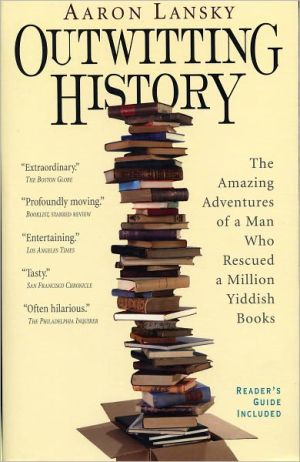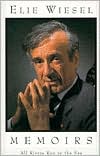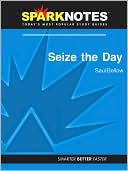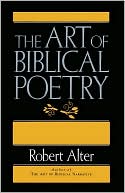Outwitting History: The Amazing Adventures of a Man Who Rescued a Million Yiddish Books
In 1980, a twenty-three-year-old student named Aaron Lansky set out to rescue the world’s abandoned Yiddish books before it was too late. Twenty-five years and one and a half million books later, he’s still in the midst of a great adventure. Filled with poignant and often laugh-out-loud tales from Lansky’s travels across the country as he collected books from older Jewish immigrants—books their own children had no use for—Outwitting History also explores brilliant Yiddish writers and enables...
Search in google:
As a twenty-three-year-old graduate student, Aaron Lanskey set out to save the world's abandoned Yiddish books before it was too late. Today, twenty-five years and one and a half million books later, he has accomplished what has been called "the greatest cultural rescue effort in Jewish history." In Outwitting History, Lansky shares his adventures as well as the poignant and often laugh-out-loud stories he heard as he traveled the country collecting books. Introducing us to a dazzling array of writers, he shows us how an almost-lost culture is the bridge between the old world and the future—and how the written word can unite everyone who believes in the power of great literature.Publishers WeeklyLansky was a 23-year-old graduate student in 1980 when he came up with an idea that would take over his life and change the face of Jewish literary culture: He wanted to save Yiddish books. With few resources save his passion and ironlike determination, Lansky and his fellow dreamers traveled from house to house, Dumpster to Dumpster saving Yiddish books wherever they could find them-eventually gathering an improbable 1.5 million volumes, from famous writers like Sholem Aleichem and I.B. Singer to one-of-a-kind Soviet prints. In his first book, Lansky charmingly describes his adventures as president and founder of the National Yiddish Book Center, which now has new headquarters at Hampshire College in Amherst, Mass. To Lansky, Yiddish literature represented an important piece of Jewish cultural history, a link to the past and a memory of a generation lost to the Holocaust. Lansky's account of salvaging books is both hilarious and moving, filled with Jewish humor, conversations with elderly Jewish immigrants for whom the books evoke memories of a faraway past, stories of desperate midnight rescues from rain-soaked Dumpsters, and touching accounts of Lansky's trips to what were once thriving Jewish communities in Europe. The book is a testimony to his love of Judaism and literature and his desire to make a difference in the world. Agent, Carol Mann. (Oct. 1) Forecast: A Jewish Book Council-sponsored national tour should help put this at the forefront of books of Jewish interest this fall and lead to handsome sales. Copyright 2004 Reed Business Information.
ForewordixPart 1Learning Yiddish11.Out of the Dumpster32.Bread and Wine93."Come Back after Yontef!"194."What Is Mendele Doing in a Fruit Basket on the Floor?"29Part 2On the Road415.A Ritual of Cultural Transmission436."Don't You Know That Yiddish Is Dead?"477.A Day in the Life578.A Brief History of Yiddish Literature699."People Are Dying Today Who Never Died Before"7910."Pretty Soon We'll Have a Whole Forest in Israel and No More Members Here"8611."Love and Peace"9312."Ostroff! Sea Gate!"10213.The Great Newark Book Heist118Part 3"Him I Don't Talk To!"12314."You're a Liar!"12515."They're Tearing Apart the Library"14016.A Ghost in the Attic15017."If Not Higher"15918."Hitler's Fault"170Part 4Ganvenen dem Grenets--Crossing the Border18119.Squandered at the Concord18320.Kaddish19421.A Job for the Young21022.The Four Corners of the Earth21923.Back in the U.S.S.R.241Part 5Bringing It All Back Home25924.Der Oylem Redt--The World Takes Notice26125.A Home of Our Own27726.Immortality28927.The Valise at the Bottom of the Sea301Notes313Acknowledgments317
\ From Barnes & NobleBarnes & Noble Discover Great New Writers\ Lansky's thoroughly entertaining book carries a dramatic subtitle, but the words are well deserved. An ordinary college student in 1973, Lansky enrolled in a course on the Holocaust. "As the semester progressed," he writes, "I found myself less interested in…how the Germans went about murdering the Jews of Europe, and more in the people whom they sought to destroy." The Ashkenazi culture that appealed to Lansky was largely recorded in Yiddish. But by the mid-20th century, Yiddish had lost much of its relevance among Jews, and unwanted Yiddish books were slowly succumbing to the Dumpsters. \ Seven years later, invigorated by youth and idealism, Lansky embarked on a quest to save Yiddish books and prevent the obliteration of Yiddish culture. On a shoestring, he and his friends rented trucks and traveled from Massachusetts to New York, where they served as the beneficiaries of Yiddish collections from the personal libraries of elderly Jewish couples, and from the warehouses of failing Yiddish publishing houses. In time, Lansky's goal of the preservation of Yiddish literature took him as far away as Canada, Cuba, Argentina, and Lithuania.\ Today, Lansky runs the National Yiddish Book Center in Amherst, Massachusetts, a thriving organization that collects, digitizes, translates, and disseminates Yiddish literature. His moving, impressive book is a testament to vision, zeal, and determination, and an inspiration to anyone who has ever faced a seemingly insurmountable task. (Holiday 2004 Selection)\ \ \ \ \ \ Publishers WeeklyLansky was a 23-year-old graduate student in 1980 when he came up with an idea that would take over his life and change the face of Jewish literary culture: He wanted to save Yiddish books. With few resources save his passion and ironlike determination, Lansky and his fellow dreamers traveled from house to house, Dumpster to Dumpster saving Yiddish books wherever they could find them-eventually gathering an improbable 1.5 million volumes, from famous writers like Sholem Aleichem and I.B. Singer to one-of-a-kind Soviet prints. In his first book, Lansky charmingly describes his adventures as president and founder of the National Yiddish Book Center, which now has new headquarters at Hampshire College in Amherst, Mass. To Lansky, Yiddish literature represented an important piece of Jewish cultural history, a link to the past and a memory of a generation lost to the Holocaust. Lansky's account of salvaging books is both hilarious and moving, filled with Jewish humor, conversations with elderly Jewish immigrants for whom the books evoke memories of a faraway past, stories of desperate midnight rescues from rain-soaked Dumpsters, and touching accounts of Lansky's trips to what were once thriving Jewish communities in Europe. The book is a testimony to his love of Judaism and literature and his desire to make a difference in the world. Agent, Carol Mann. (Oct. 1) Forecast: A Jewish Book Council-sponsored national tour should help put this at the forefront of books of Jewish interest this fall and lead to handsome sales. Copyright 2004 Reed Business Information.\ \ \ Library JournalJoin this former MacArthur fellow on his incredible journey to revive interest in the Yiddish language and culture. Part memoir and part history, this is the compelling tale of how Lansky retrieved thousands of books from dumpsters and abandoned buildings across America. He also rescued books from the aftermath of the 1994 terrorist bombing of the Jewish Community Center in Buenos Aires and went to Havana to save the few remaining Yiddish books of a vestigial Jewish community there. Throughout, Lansky shares inspiring anecdotes and references to a dazzling array of Yiddish writers. In the words of scholar Max Weinreich, Lansky shows us that Yiddish was the product of "two dialectical forces one rooted in Hebrew and Aramaic texts" and the other rooted in everyday life. In the end, a provocative question lingers: How could the very "people of the book" have discarded Yiddish books and culture? One can only be comforted with the fact that, thanks in large measure to the efforts of Lansky and the National Yiddish Book Center, which he founded, Yiddish literature survives. This important book is highly recommended for the general reading public and all libraries.-Herbert E. Shapiro, Empire State Coll., SUNY at Rochester Copyright 2004 Reed Business Information.\ \ \ \ \ Kirkus ReviewsEngaging first-person account of how some committed young people rescued from history's dustbin more than a million books published in Yiddish. In prose that sometimes lurches and jolts along like the overloaded rental trucks that the author and his merry band used to collect books, Lansky unfolds a tale of rare emotion and devotion. He was only 23, in 1980, when he made the decision to dedicate himself to the cause of saving books in Yiddish. He had begun studying the language while at Hampshire College and was shocked to discover that many libraries were discarding Yiddish works by the thousands because so few circulated. His account of his rescue efforts takes the form of an adventure story, related with a breathless and appealing Andy Hardy earnestness. The author and his companions pluck books from Dumpsters in the rain, from closing libraries, from damp garages and basements, from dour doubters, from aging Jews who surrender them like favorite children-with flowing tears, many tales, and much food. They make harrowing missions to Russia and Cuba. But it all pays off: Lanksy now oversees a huge enterprise comprising a state-of-the-art facility, the National Yiddish Book Center, and a membership of some 35,000 supporters. He is digitizing the volumes, virtually all of which were printed on paper whose acid content assures disintegration. The purpose of the Book Center is not to hoard but to distribute the volumes. It maintains a core collection but considers putting books into the hands of readers among its chief purposes, in addition to making sure key titles are in libraries where scholars can consult them. Lansky also chronicles the history of Yiddish, his fundraising efforts(considerably accelerated by a 1989 MacArthur genius grant), and his countless public appearances (including a funny episode at a Catskills resort). A rollicking ride in company with a man who has performed an enormously important public service.\ \ \ \ \ Boston Globe"What began as a quixotic journey was also a picaresque romp, a detective story, a profound history lesson, and a poignant evocation of a bygone world."\ —The Boston Globe\ \ \ \ \ New York Post"A marvelous yarn, loaded with near-calamitous adventures and characters as memorable as Singer creations."\ —New York Post\ \






